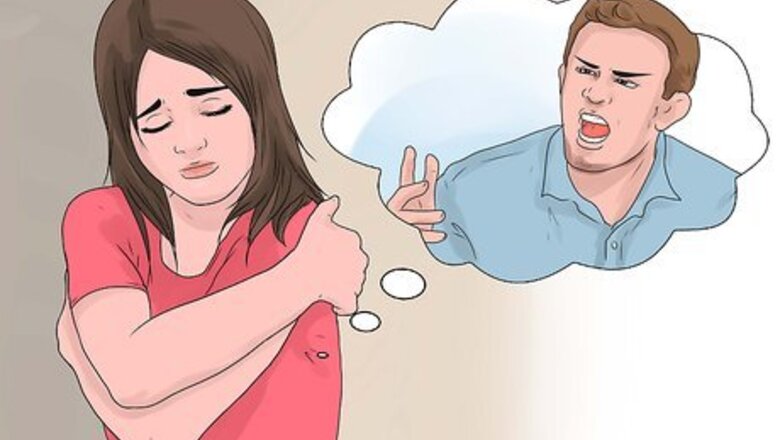
views
X
Trustworthy Source
Centers for Disease Control and Prevention
Main public health institute for the US, run by the Dept. of Health and Human Services
Go to source
Abuse occurs as commonly in LGBTQ relationships as heterosexual relationships. Men may also be the victims of abusive partners.[2]
X
Trustworthy Source
Centers for Disease Control and Prevention
Main public health institute for the US, run by the Dept. of Health and Human Services
Go to source
Abuse is never the victim’s fault. Whether you’re concerned that you’re in an abusive relationship or that someone you know is being abused, there are things you can do to help you identify abuse. If you need immediate help, call the National Domestic Violence Hotline at 1-800-799-SAFE or call emergency services such as 911.
Psychological and Emotional Abuse

Think about whether you feel safe. Threatening to hurt you or your loved ones, especially your children, is a common tactic by abusive partners. Abusers may also destroy your property or threaten your pets. Even the threat of violence is abuse. If you do not feel safe and stable in your relationship, this is a sign that you need immediate help. Gay, bisexual, or transgender individuals may also face the threat of being forcibly “outed” to friends, family, or coworkers by their abusers.

Consider whether you feel heard in the relationship. There is a vast difference between a partner “being in charge” or “taking responsibility” and an abusive partner. Even in relationships where one partner usually takes responsibility for a certain area, such as finances or childcare, both partners should feel as though their ideas and needs are acknowledged. When partners disagree on how something should be handled, a healthy relationship will listen to both sides and come to a compromise. Abusive relationships are extremely one-sided. An abuser is dominant in all areas of the relationship. S/he does not allow decisions or ideas to be questioned. S/he does not listen to your ideas, desires, or needs. There is no sense of mutuality or collaboration. If you do not feel like your partner listens to you or acknowledges your needs and wishes, this is a sign that you may be in an abusive relationship.

Consider whether you feel the need to “love” your partner into change. This belief is a red flag. Often, the victims of abusive relationships believe that their abuse is their fault, and that if they simply love their partners enough the abuse will stop.This is not true. This belief is often compounded by the abuser, who may make claims that s/he is “trying” to get better or say that s/he “needs” your help to change. Remember that each person’s actions are their own choice. You are not responsible for your partner’s abuse and it is not your responsibility to “fix” your partner. Abusers may threaten to harm or kill themselves if you leave. This is manipulation and emotional abuse. You may feel like you should stay in the relationship to keep this from happening, but it isn’t your responsibility.

Consider whether your partner takes responsibility for actions. Abusive people blame others for their feelings and their actions. They will force you to take responsibility for how they treat you even though it is not your responsibility to control them. An abuser will try to make you feel guilty when you don’t give him/her what s/he wants. For example, an abuser might say “You’re making me so angry I can’t control myself” or “I can’t help feeling jealous because I love you so much.” The abuser will try to manipulate you into doing what s/he wants by pushing responsibility onto you: “When you don’t do what I want I get crazy” or “I’ll kill myself if you don’t do what I want to do.”

Think about your “free time.” Even the most intimate, close healthy relationships give each partner personal space. Abusive relationships do not. The abusive partner is often extremely jealous and controlling. Consider whether you are able to do the following: Spend time on your own, without your partner. People in abusive relationships are often tightly controlled by their partners. Abusers usually do not want their partners to be on their own at any time. They may monitor their partners’ time and activities closely. They may refuse to allow you to be on your own, saying they “love you too much” to be away from you. Spend time with friends. Abusive partners will often isolate their victims from others. The abused partner is not “allowed” to have friends or even see family or coworkers without getting permission from the abuser. The abuser may say s/he is “jealous” of others’ attention and doesn’t want you to be around anyone but him/her. Be out and about without reporting back to your partner. Abusive partners often “check up” on their partners. Abused partners often feel like they have to “report” on their activities and routines. Use technology. An abusive partner may use technology to control you. You may not feel free to have your own email or social media accounts. Your partner may send you threatening messages or attempt to blackmail you. S/he may demand your online passwords and monitor your technology use. S/he may insist that you answer your cellphone whenever s/he calls you, and may demand to “inspect” your phone to see who else you are contacting.

Consider whether you have economic freedom. Abusive partners may tightly control the household finances. They may take money that you earn, refuse to give you money for expenses, or require you to “earn” money from them by doing something for them. All of these actions are designed to keep you dependent on the abuser so you cannot leave. Other types of economic abuse include forbidding you from attending school or getting a job. Abusive partners will often refuse debit or credit cards to their partners. They may also take out credit lines in your name. Even small or reasonable expenses may send them into a rage. Men who are abused in relationships may feel unable to leave the relationship if they make less than their partner.

Think about how your partner talks to you. In healthy relationships, partners do not use contempt, name-calling, disrespect, or other abusive language. If you consistently feel humiliated, belittled, threatened, disrespected, or intimidated by your partner, this is a sign that you are in an abusive relationship. Name-calling and other forms of verbal abuse are still abuse. A partner who calls you “crazy” or “stupid” or “ugly” is abusing you. Belittling is a very common abusive tactic. An abusive partner may tell you that you “never do anything right” or will “never find anyone else who loves you.” These kinds of things are meant to keep you feeling dependent on the abuser. Emotional and psychological abuse may happen in public or in front of other people, making it easier for others to identify. The abused person may stay quiet or appear passive when the abuse is happening. This doesn’t mean that s/he is “okay” with or “used to” this abuse.

Consider whether abuse seems to come in cycles. All relationships have moments of conflict and times when things don’t seem great. However, abusive relationships have a particular cycle that repeats over and over again: An abusive incident. This is any type of abuse, including emotional, physical, or sexual. A period of tension. The abuser may become angry. S/he may blame the victim for the abusive incident. The victim will often feel like s/he is “walking on eggshells.” A “make-up” period. The abusive person may apologize profusely. S/he will likely promise it will “never happen again.” S/he may also try to minimize or deny that abuse took place, or offer excuses such as “I was just angry.” A period of “good” time. The abusive person will often behave fairly well for some period of time. S/he may give you gifts or be nice to you. S/he may even keep promises made during the make-up period. However, because the underlying reasons for abuse have not been addressed, this will not last. Tension will build up again. Another abusive incident occurs.
Sexual Abuse

Consider whether you enjoy your sexual encounters with your partner. It is a common myth that when you are in a relationship you “owe” your partner sex. This is untrue. If you are being coerced, intimidated, or forced to participate in sexual activities when you do not want to, this is sexual abuse. Men may also be victims of sexual abuse. For example, coerced sex, unwanted sexual contact, or being made to penetrate a partner are all examples of sexual abuse that men can experience in relationships. Demanding you to perform particular acts that you do not want to do is also abuse. Even if you enjoy some sexual activities, a healthy partner will never force you to perform any activities that you are not interested in, or that frighten or disturb you. Some people believe that it is impossible to be guilty of rape within a marriage or intimate relationship. This is not true. Marriage or a romantic relationship does not bind you to a contract where you can never say no to sex. A spouse who forces his/her spouse to perform sex acts through violence (or threats of violence) is guilty of marital rape, which is illegal.

Consider whether sex is used as a punishment. An abusive relationship does not have a healthy, mutually enjoyed sexual relationship between partners. The abusive partner may withhold sex as a “punishment” for perceived wrongdoing. Or, the abusive partner may punish you by making you perform sexual acts that you don’t want to do. Abusers may also use sex as a “make-up” after a violent incident, even if you don’t feel like it.

Think about whether you have freedom to dress as you want. Abusers are usually extremely jealous and overprotective of their partners. An abusive partner generally believes s/he should be in complete control of how you dress and present yourself. Your partner may restrict what clothes you buy and what you are allowed to wear. Your partner may become angry or violent if you wear something s/he does not approve of, especially if it is considered “too sexy.” Your partner may become angry and jealous and blame you if others pay attention to your appearance. Your partner may demand that you wear things that you do not like or that make you uncomfortable.
Physical Abuse

Know that physical abuse may not happen immediately. Even abusive relationships can seem wonderful, even “perfect,” at the beginning. The abusive partner may be attentive and demonstrate his/her love in extravagant ways. You may hope that you can get the relationship back to this idealized state by staying, but this is extremely unlikely. Abusers often go through a “honeymoon period” early in the relationship. They may appear to be the ideal partner. You may feel as though you are the center of his/her world, or that s/he is “too good to be true.” The abuser will slowly condition you to accept his/her abusive behavior as signs of “love” for you. Physical abuse rarely happens in isolation from other abuses. Abusers use a variety of abusive techniques, from physical violence to emotional, sexual, and psychological abuse, to force their victims to accept their control.

Recognize the signs of physical abuse. There are many types of physical abuse. Physical violence is more than just hitting, choking, or kicking you. All of the following are types of physical violence: Denying you the right to meet basic needs, such as food and sleep Destroying property or breaking things Physically keeping you from leaving the house, going to the hospital, or calling emergency services Threatening you with a weapon Kicking you out of the house or the car Driving aggressively or dangerously while you are in the car Physically abusing your children Leaving you alone or abandoning you in strange or dangerous places

Understand that there is no acceptable level of violence. If your partner throws or breaks things when s/he’s angry or harms you, this is a sign that s/he needs counseling. It is also a sign that violence within the relationship could escalate later. Healthy relationships do not use yelling, hitting, choking, or breaking things as a way to express anger, even when couples fight. Remember: you have a right not to feel afraid in your relationship.

Consider whether you have control over your health. Another way abusers control their partners is by controlling their access to healthcare, especially sexual healthcare. This is a form of physical abuse because you have the right to determine how you care for your own body. The following are some signs of abuse in this area: Your partner comes with you to your doctor and does not let you speak. S/he attempts to answer all the questions for you. S/he may not let you see the doctor by yourself. Your partner does not allow you to seek medical attention. Your partner requires you to do things that damage your health, such as use drugs or alcohol. Your partner controls your access to and use of birth control. Your partner does not use safer sex practices. Your partner controls your decisions about pregnancy and/or abortion.
Getting Help

Call emergency services. Calling 911 or other emergency services establishes a legal record of the abuse. It will usually stop your abuser for a time. Tell the police about abuse. Document any marks on your body or injuries. Describe what is happening in detail, including any physical or emotional abuse. Write down officers’ badge numbers, names, and the report number. This will help you get a copy of the police report later if you need it.

Identify safe places. It can be hard to leave your home if you are being abused. Your abuser may prevent you from leaving the house or may demand to know where you are at all times. Identify places where you can go, such as a friend’s house or a local “safe space.” There may be a neighborhood “safe house” or safe shelter in your area. These are usually maintained by nonprofit organizations and will help you coordinate with legal protection and counseling. A domestic violence hotline, such as the National Domestic Violence Hotline (1-800-799-7233), can help you find one near you.

Do not retaliate. Retaliation can be extremely dangerous. In many cases of domestic violence, female partners are not as large or strong as male partners. You may only make your situation worse if you attempt to retaliate. This is especially true for men, who may face the possibility of being arrested for battery if they strike a woman.

Get to the hospital. Hospitals can help you document your injuries and physical abuse. Nonprofit agencies usually can work with hospitals to provide services to victims of domestic violence while they’re in the hospital. Call 911 or ask a friend to drive you. Domestic violence can cause serious injury. If you experience dizziness, nausea, blurred vision, or headache, you may have a head trauma. You should seek immediate medical attention if you are pregnant and were hit or kicked in your abdomen.

Form a personalized safety plan. The National Center on Domestic and Sexual Violence has a PDF form to help you plan strategies to increase your safety. Print it out and keep it in a safe place where your partner cannot find it. You may wish to leave a copy with a trusted friend or counselor, too. That way they will know what your plans are. Use a public library computer to print out the form if your partner monitors your computer use.
Identifying Unhealthy Relationships

Think about your own identity. Sometimes, relationships can be unhealthy without being abusive. If you feel so wrapped up in your significant other that you can’t imagine your identity without him or her, this could be a sign of codependence, which isn’t healthy for a relationship. You should be able to spend time with friends, relatives, and coworkers. Your life should involve loved ones other than your spouse or partner. It’s important to spend time on your own and develop your own interests, even in the healthiest and closest relationships. If you don’t feel comfortable being alone, it could be a sign that you’re focusing too exclusively on your partner. If you or your partner experience this type of exclusive focus on each other, consider seeing a couples counselor or therapist. Counseling can help you learn how to achieve a healthier relationship dynamic that honors each of you as a unique individual as well as your couple partnership.

Consider how you make decisions. Failing to have productive discussions together or compromise isn’t necessarily a sign of an abusive relationship, but it is a sign that there’s room for improvement. You should feel comfortable sharing your needs and desires with your partner, and vice versa. Both of you should be willing to compromise when necessary. Even if one of you generally makes the decisions in a particular area, both partners should have input. You should not keep secrets from each other.

Think about how you feel around your partner. All relationships have their ups and downs. However, if you consistently feel sad, ignored, or neglected around your partner, your relationship likely has issues that need to be addressed. Couple counseling can be helpful for these issues. You may not feel as though your partner listens to your needs. You may not feel adequately emotionally supported by your partner. This could be because your partner doesn’t know what you’re feeling or what you need. Try sitting down and communicating clearly and honestly about what you feel and what you need. You may feel dismissed by your partner. This can happen when one person’s needs or desires are the focus of the relationship, rather than achieving a balance between both partners. You or your partner may get defensive when criticized. Criticism may be harsh or unproductive, such as “You never remember to take me out on dates” or “You don’t understand me.”




















Comments
0 comment